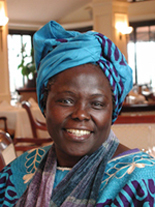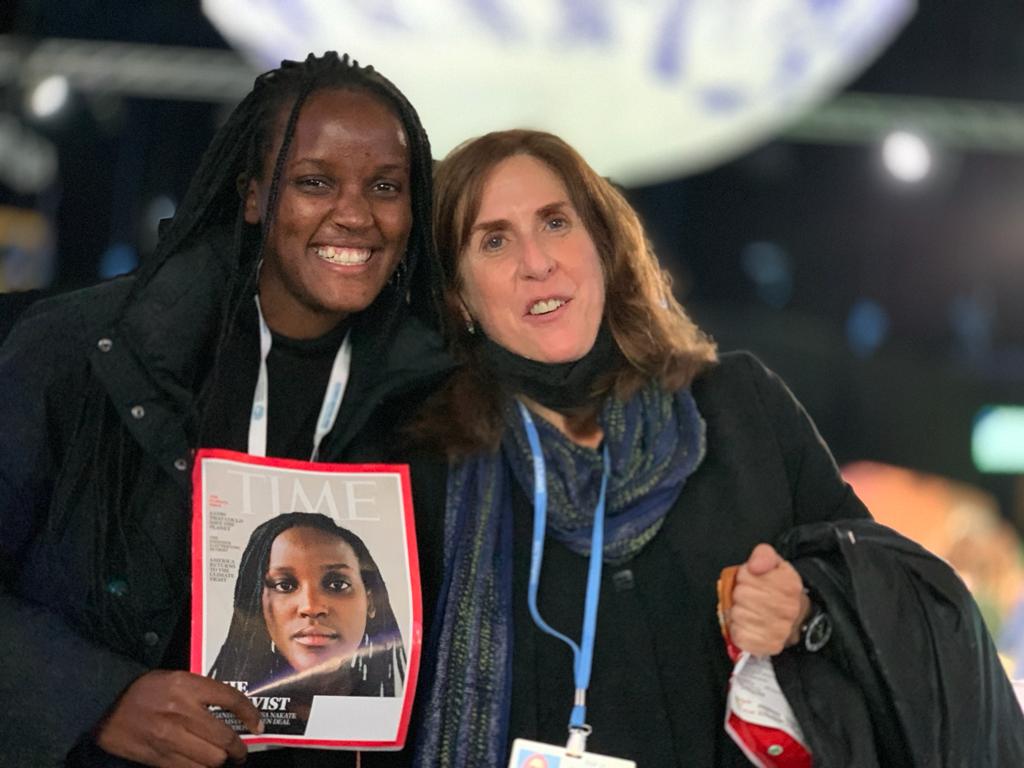Mia MacDonald is a past president of the Green Belt Movement International-U.S. board. She worked with Wangari Maathai for a decade on varied projects, including four books.

When Wangari Maathai (left in 2004) stood in Oslo’s City Hall on a cold, bright afternoon in December 2004 to receive the Nobel peace prize medal, she was making history as the first African woman and first environmentalist to be so honored. Yet, we know that for years before that she had been shaping history. Now, two decades on, her life and work remain essential reference points for creating a sustainable, sane, and just future for all Earth’s inhabitants.
Prof, as she was widely known due to her years as a popular and well-respected professor at the University of Nairobi, loved this quote from Mahatma Gandhi: “My life is my message.” She believed it for herself, and she was proof of it. Her life embodied purpose, tenacity, and remarkable fearlessness. Prof always looked for answers to problems and challenged herself and those around her, including at the Green Belt Movement, to avoid complacency of any kind. She never cared about accumulating money, property, fame, or popularity, or, for that matter, awards.
In fact, right after she received the news that she’d been named the peace laureate for 2004, she turned to me and, with light tears rolling down her cheeks, said, “I didn’t know anyone was listening.” But they—and we—were. I was with her that morning as she traveled from Nairobi to Nyeri, to what was then her parliamentary constituency, close to where she’d grown up. We were working on the manuscript for what became her autobiography, Unbowed, published in 2006. (Not surprisingly, the announcement paused any more work on the book that day.)
In the course of her life, Prof dealt with setbacks, skepticism, loss, and even violence (in words and acts) from vengeful authorities. But she wasn’t derailed. “Every person who has ever achieved anything has been knocked down many times,” she wrote. “But all of them picked themselves up and kept going, and that is what I have always tried to do.”

The journey to the Nobel was a testament to her foresight, and her legacy to this day is a reflection of her wisdom and clarity of purpose. Prof was a storyteller and a moralist. She alchemized science, spirituality, and a deep belief in humanity into compelling explanatory narratives that demanded action. She sought to close the chasm between what is and what should be, and agitated for others, particularly those with power, to do the same.
All of this is why, two decades after the Nobel, Prof remains a beacon to young campaigners for climate justice and youth movements demanding democratic governance, civil and human rights, and an end to impunity. This is true in Kenya, across Africa, and, indeed, around the world. One of the young climate justice activists who embodies Prof’s moral vision and work ethic is Vanessa Nakate of Uganda (seen above, left, with me in Glasgow, 2021). Vanessa has become a leader in the global climate movement, stepping into her power despite, by her own assessment, being shy and something of a loner.
During the early stages of pandemic lockdowns, I began working with Vanessa on a book—a memoir, a call to action—that was published just before the 2021 UN climate summit in Glasgow, Scotland: A Bigger Picture: My Fight to Bring a New African Voice to the Climate Crisis. In the book, she acknowledged Wangari’s inspiration as a role model. It was in Glasgow that I got to meet Vanessa for the first time and to share with her the global edition of TIME magazine that featured her on its cover (it was the first time she’d seen a hard copy). Vanessa is now studying for a master’s degree at Oxford University.
Twenty years ago, the dangers of climate change were present, but they were not at the center of global concerns as they still are now, despite some governments’ backsliding. Acknowledging that the struggle to control resources was at the root of armed conflict and war was a truth Prof practiced and preached.
She advocated for the protection and restoration of forests, understanding the lives they support, the ecosystem services they provide, the carbon dioxide they captured, and planting trees, literally billions of them, none of which were international priorities.
Her legacy is manifest through the work of the GBM and her advocacy for greater democratic space, along with her ability to make the crucial linkages between human rights, environmental protection, poverty, equality, and equity. Today, the policy makers are making these same connections, in an expanding body of governmental policies on climate change, biodiversity, gender, public participation, conflict resolution, and peacebuilding.
In a time when cynicism, autocracy, oligarchy, inequalities in wealth and power, persistent poverty and marginalization, rampant consumerism, state-sponsored cruelty, and the realities of climate breakdown loom large, it can be easy to become discouraged, furious, or shut down.
“In the course of history, there comes a time when humanity is called to shift to a new level of consciousness, to reach a higher moral ground,” Prof said in her Nobel lecture. “A time when we have to shed our fear and give hope to each other. That time is now.” As we celebrate Prof’s “Nobel+20” (October 2024-October 2025) I believe she would tell us, remember, it’s still that time, and, popular opinion notwithstanding, to act accordingly.
As she wrote at the end of Unbowed: “Those of us who witness the degraded state of the environment and the suffering that comes with it cannot afford to be complacent. We continue to be restless. If we really carry the burden, we are driven to action. We cannot tire or give up. We owe it to the present and future generations of all species to rise up and walk!”
